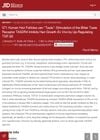 56 citations,
November 2010 in “Pigment Cell & Melanoma Research”
56 citations,
November 2010 in “Pigment Cell & Melanoma Research” Brain hormones significantly affect hair color and could potentially be used to prevent or reverse grey hair.
9 citations,
May 2019 in “Medicine” The C-allele and CC-genotype in the PTPN22 gene lower the risk of alopecia areata.

Women with Polycystic Ovary Syndrome (PCOS) have a higher risk of developing type 2 diabetes due to insulin resistance.
 82 citations,
January 2002 in “Journal of drug targeting”
82 citations,
January 2002 in “Journal of drug targeting” Drugs penetrate scalp skin better than abdominal skin, with scalp hair follicles aiding in higher drug delivery.
 April 2018 in “The journal of investigative dermatology/Journal of investigative dermatology”
April 2018 in “The journal of investigative dermatology/Journal of investigative dermatology” Electrical epilation damages hair follicles and surrounding skin, likely preventing hair regrowth.
January 2022 in “Indian Journal of Paediatric Dermatology” A 13-year-old girl was diagnosed with juvenile lupus, showing only hair loss as a symptom.
 January 2011 in “Faculty Opinions – Post-Publication Peer Review of the Biomedical Literature”
January 2011 in “Faculty Opinions – Post-Publication Peer Review of the Biomedical Literature” Bald men with male pattern baldness still have hair stem cells, but lack certain cells needed to grow hair.
 January 2011 in “Faculty Opinions – Post-Publication Peer Review of the Biomedical Literature”
January 2011 in “Faculty Opinions – Post-Publication Peer Review of the Biomedical Literature” Bald men with male pattern baldness still have hair stem cells, but lack certain cells needed for hair growth.
 41 citations,
February 2001 in “Current pharmaceutical design”
41 citations,
February 2001 in “Current pharmaceutical design” Current and future treatments for alopecia areata focus on immunosuppression, immunomodulation, and protecting hair follicles.
 6 citations,
November 2017 in “Dermatologic Therapy”
6 citations,
November 2017 in “Dermatologic Therapy” Combining mometasone furoate cream with adapalene gel is safer and more effective for hair regrowth in alopecia areata than using the cream alone.
 23 citations,
June 2003 in “Journal of Investigative Dermatology Symposium Proceedings”
23 citations,
June 2003 in “Journal of Investigative Dermatology Symposium Proceedings” Alopecia Areata is an autoimmune disease affecting hair follicles, influenced by genetic and environmental factors, with rodent models being essential for research.
 August 2023 in “Authorea (Authorea)”
August 2023 in “Authorea (Authorea)” Tinea capitis should be considered in adults with scalp issues for proper treatment.
 122 citations,
July 2005 in “The FASEB journal”
122 citations,
July 2005 in “The FASEB journal” Hair follicles produce and respond to melatonin, affecting hair growth and sensitivity to estrogen.
 1 citations,
October 2010 in “Cambridge University Press eBooks”
1 citations,
October 2010 in “Cambridge University Press eBooks” Hormonal therapies are effective for managing hair and skin symptoms in women with PCOS.
 January 2021 in “International journal of basic and clinical pharmacology”
January 2021 in “International journal of basic and clinical pharmacology” Hydroxychloroquine is less effective than betamethasone oral mini pulse therapy for treating alopecia areata.
 30 citations,
September 2003 in “Experimental Dermatology”
30 citations,
September 2003 in “Experimental Dermatology” Minoxidil helps prevent stress-caused hair loss in mice.
8 citations,
January 2019 in “The journal of investigative dermatology/Journal of investigative dermatology” Growth hormone is important for regulating human hair growth.
 47 citations,
April 2000 in “The American journal of pathology”
47 citations,
April 2000 in “The American journal of pathology” Bcl-2 overexpression protects against UVB damage but worsens hair loss from chemotherapy.
 July 2022 in “The journal of investigative dermatology/Journal of investigative dermatology”
July 2022 in “The journal of investigative dermatology/Journal of investigative dermatology” Blocking mTORC1 activity with rapamycin could help increase hair pigmentation and growth, potentially reversing gray hair.
 5 citations,
July 2019 in “Photodiagnosis and photodynamic therapy”
5 citations,
July 2019 in “Photodiagnosis and photodynamic therapy” Using tacalcitol ointment with photodynamic therapy may effectively treat follicular mucinosis with scalp hair loss.
 28 citations,
February 1999 in “Archives of Dermatological Research”
28 citations,
February 1999 in “Archives of Dermatological Research” Finasteride potentially treats hair loss by reducing DHT production.
 January 2022 in “DOAJ (DOAJ: Directory of Open Access Journals)”
January 2022 in “DOAJ (DOAJ: Directory of Open Access Journals)” Argan oil-based nano carriers could potentially deliver caffeine to hair follicles to treat hair loss.
 July 2023 in “Dermatology practical & conceptual”
July 2023 in “Dermatology practical & conceptual” Some lung cancer patients treated with EGFR inhibitors may develop a hair loss condition similar to folliculitis decalvans.
29 citations,
January 2013 in “The journal of investigative dermatology/Journal of investigative dermatology” P-cadherin is crucial for hair follicle pigmentation but not skin pigmentation.
26 citations,
July 2021 in “International journal of adolescent medicine and health” New treatments for PCOS are improving fertility and managing symptoms better.
 28 citations,
August 2014 in “Journal of Assisted Reproduction and Genetics”
28 citations,
August 2014 in “Journal of Assisted Reproduction and Genetics” The VEGF +405G allele may increase the risk of PCOS in South Indian women.
 41 citations,
March 1998 in “Archives of Dermatological Research”
41 citations,
March 1998 in “Archives of Dermatological Research” The enzyme that changes testosterone to a stronger form is mostly found in the part of the hair follicle called the dermal papilla.
 November 2022 in “Journal of Investigative Dermatology”
November 2022 in “Journal of Investigative Dermatology” Activating a bitter taste receptor in hair follicles can stop hair growth by increasing a specific growth factor.
 April 2011 in “Faculty Opinions – Post-Publication Peer Review of the Biomedical Literature”
April 2011 in “Faculty Opinions – Post-Publication Peer Review of the Biomedical Literature” Bald men with male pattern baldness still have hair stem cells, but lack certain cells needed for hair growth.
 98 citations,
July 2014 in “Trends in Molecular Medicine”
98 citations,
July 2014 in “Trends in Molecular Medicine” Hair follicles are hormone-sensitive and involved in growth and other functions, with potential for new treatments, but more research is needed.

























